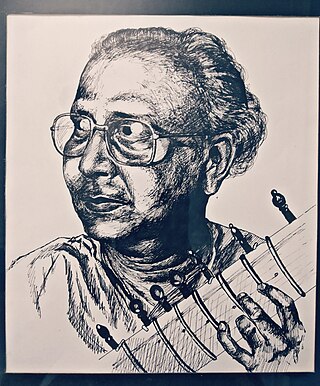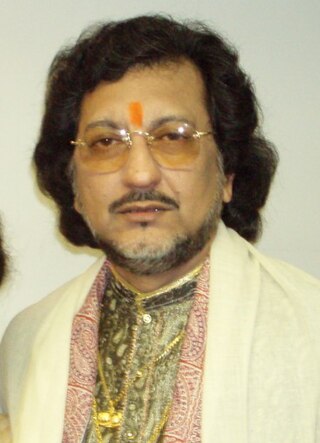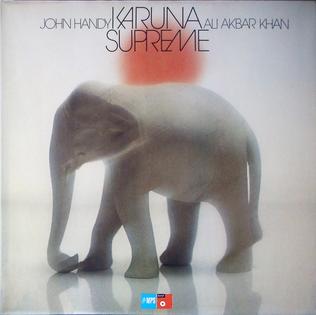
Zakir Hussain is an Indian tabla player, composer, percussionist, music producer and film actor. He is the eldest son of tabla player Alla Rakha. He is widely considered as one of the greatest tabla players of all time.

Ustad Alla Rakha Qureshi, mononymously known as Alla Rakha, was an Indian tabla player who specialised in Hindustani classical music. He was a frequent accompanist of sitar player Pandit Ravi Shankar and was largely responsible for introducing tabla to the Western audience.

Ali Akbar Khan was an Indian Hindustani classical musician of the Maihar gharana, known for his virtuosity in playing the sarod. Trained as a classical musician and instrumentalist by his father, Allauddin Khan, he also composed numerous classical ragas and film scores. He established a music school in Calcutta in 1956, and the Ali Akbar College of Music in 1967, which moved with him to the United States and is now based in San Rafael, California, with a branch in Basel, Switzerland.

Ustad Allauddin Khan, also known as Baba Allauddin Khan was an Indian sarod player and multi-instrumentalist, composer and one of the most notable music teachers of the 20th century in Indian classical music. For a generation many of his students, across different instruments like sitar and violin, dominated Hindustani classical and became one of the most famous exponents of the form ever, including Ravi Shankar and Ali Akbar Khan.

Pandit Nikhil Ranjan Banerjee was an Indian classical sitarist of the Maihar Gharana. Along with Pandit Ravi Shankar and Ustad Vilayat Khan, he emerged as one of the leading exponents of the sitar. He was a recipient of the Indian civilian honour of the Padma Bhushan.
Ustad Bahadur Khan was an Indian sarod player and film score composer.
The Maihar Band is an instrumental musical group in the Indian city of Maihar that performs both Indian and western music. After an epidemic orphaned many children, Allauddin Khan, a musician of the Maihar court who was moved by the tragedy, taught them how to play music and formed an orchestral group later known as the Maihar Band. The ruling prince, Braj Nath Singh, cooperated and helped Allauddin Khan in procuring and preparing required instruments.
The Maihar Gharana or Maihar-Senia Gharana is a gharana or school of classical music, a style of Indian classical music originating in the northern parts of the Indian subcontinent. The school was formed by Allaudin Khan in the princely state of Maihar, now in the central Indian state of Madhya Pradesh, and hence the name. Allauddin Khan learnt music from Vina player Wazir Khan, an exponent of the Senia gharana. The Maihar gharana is therefore sometimes referred to as the Maihar-Senia gharana.

Pandit Swapan Chaudhuri, is an Indian tabla player. He has accompanied several musicians of Indian classical music, including, Pandit Ravi Shankar, Ustad Ali Akbar Khan, Ustad Vilayat Khan, Pandit Bhimshen Joshi, Pandit Jasraj., Ustad Amjad Ali Khan and many more. He also taught his sons tabla. Guru- Santosh Biswas

Pandit Kumar Bose, born 4 April 1953, is an Indian tabla musician and composer of Indian classical music.

Pandit Anindo Chatterjee is an Indian tabla player of the Farrukhabad gharana school. He was born into a musical family. Chatterjee is a disciple of Pandit Jnan Prakash Ghosh.
Debasis Chakroborty is an Indian classical slide guitar player from Senia-Maihar Gharana.
Pandit Rabin Ghosh (1932–2010), a 20th-century violin virtuoso of 'Seni-Maihar' Gharana of North Indian Classical Music, India, was a disciple of Baba Ustad Allauddin Khan Saheb. He was noted for his unique style of playing 'Ati-Vilambit' with an extensive use of 'Micro-Tone' to imitate the Indian Singing style.

In Concert 1972 is a double live album by sitar virtuoso Ravi Shankar and sarodiya Ali Akbar Khan, released in 1973 on Apple Records. It was recorded at the Philharmonic Hall, New York City, in October 1972, and is a noted example of the two Hindustani classical musicians' celebrated jugalbandi (duet) style of playing. With accompaniment from tabla player Alla Rakha, the performance reflects the two artists' sorrow at the recent death of their revered guru, and Khan's father, Allauddin Khan. The latter was responsible for many innovations in Indian music during the twentieth century, including the call-and-response dialogue that musicians such as Shankar, Khan and Rakha popularised among Western audiences in the 1960s.

Swara Samrat festival is a four-day annual festival of Indian classical music and dance held during the winters in Kolkata, India. This festival is the brainchild of Sarod maestro Pandit Tejendra Narayan Majumdar, his vocalist wife, Manasi Majumder and their Sarod player-son Indrayuddh Majumder. The festival is dedicated to Swara Samrat Ustad Ali Akbar Khan. Indian Classical Music and Dance Legends such as Pandit Shivkumar Sharma, Pandit Birju Maharaj, Pandit Hari Prasad Chaurasia, Pandit Jasraj, Ustad Zakir Hussain, Ustad Aashish Khan, Dr. Girija Devi, Begum Parveen Sultana, Pandit Swapan Chaudhuri, Guru Karaikudi Mani, Ustad Rashid Khan, Shankar Mahadevan, Pandit Budhaditya Mukherjee, Pandit Ulhas Kashalkar, Pandit Venkatesh Kumar, Pandit Ajoy Chakraborty, Pandit Anindo Chatterjee, Pandit Sanjay Mukherjee, Ustad Shahid Parvez, Ustad Shujaat Khan, Pandit Tejendra Narayan Majumdar, Pandit Kushal Das, Pandit Rajendra Gangani, Guru Sujata Mohapatra, Pandit Subhankar Banerjee, Pandit Yogesh Samsi, Pandit Bickram Ghosh, Pandit Tanmoy Bose and Kaushiki Chakraborty are some of the artists who have previously performed in this festival.
Ashutosh Bhattacharya was a noted Indian classical musician of Hindustani classical music from Varanasi, who was Tabla player and music educator, besides a practicing Ayurvedic doctor.

Subhen Chatterjee is an Indian percussionist and tabla player. Chatterjee began his training on the tabla in his childhood, studying with Swapan Chaudhuri. In 1985 he created the fusion band Karma. He has accompanied the vocalist Girija Devi on several recordings including Songs of Varanasi for Nimbus Records. He has also recorded with V.M. Bhatt and Matt Malley on the album Sleepless Nights for World Village Records. His album Artistry recorded live in Kansas City with Manilal Nag on sitar, Ramesh Mishra on sarangi and Chatterjee on tabla was nominated for a Grammy Award in 2002.

Karuna Supreme is an album by American jazz saxophonist John Handy and sarod player Ali Akbar Khan which was recorded in 1975 and originally released on the MPS label.
Mehmood Dhaulpuri was an Indian musician of Hindustani music, known as a leading exponent of Harmonium, an Indian variant of the Pump organ. He was an accompanist to renowned Hindustani vocalists such as Parveen Sultana, Bhimsen Joshi, Jasraj, Girija Devi, Kishori Amonkar and Ustad Ghulam Sadiq Khan. The Government of India awarded him the fourth highest civilian honour of the Padma Shri, in 2006, for his contributions to Music, making him the first harmonium player to receive the award.
Pandit Nikhil Jyoti Ghosh was an Indian musician, teacher and writer, known for his proficiency in the percussion instrument of tabla. He founded Sangit Mahabharati, an institution of music in 1956, and performed on various stages in India and abroad. A recipient of the Ustad Hafiz Ali Khan Award, his style was known to have been aligned with the Delhi, Ajrada, Farukhabad, Lucknow and Punjab gharanas of music. The Government of India awarded him the third highest civilian honour of the Padma Bhushan, in 1990, for his contributions to Music.












